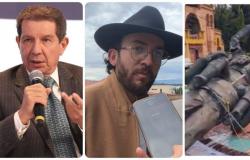
“I want to say something about being declared an outstanding cultural personality. The personality thing… who knows? And what’s outstanding… remains to be seen. What is certain is that I was, I am and I will be a fervent promoter of culture. From a very young age, when I bought The paper cricket either Movie time, and cut out and glued the artists’ figurines at home. And that makes me very proud. Much more in this moment, when culture is threatened, at risk, with the possibility of stopping many spaces from ceasing to exist, such as public radio, Telam or Public TV.” Visibly moved, without forgetting his commitment to art, much less his sense of humor or his passion for Racing, Carlos Ulanovsky yesterday received recognition from the Buenos Aires Legislature as outstanding personality of culturein a meeting that – as happened almost 8 months ago, when he turned 80, at the National Library – once again celebrated the life of one of the great masters of Argentine journalism.
The Ulanovsky family in all its extension was present in the Golden Hall of the Buenos Aires Legislature. The closest one, her daughters Inés and Julieta, her grandchildren Bruno and Carmela, and her partner Liliana, was stoic in the front row. But also the extended family by adoption, one that includes friends, colleagues, disciples and co-workers who admire and love the honoree. The one that goes from Taty Almeida to the draftsman Augusto Costhanzogoing by Víctor Hugo Morales, Any Ventura, Hugo Paredero, Gabriela Radice, Ari Lijalad, Nora Veiras, Luciana and Mario Mactas, Luciana de la Calle, among many others. As Miguel Rep, which hit the right note with the drawing that accompanied the event, in which a huge letter “U” flew over the City – like a bat signal – with the legend “Ulanovsky Constellation over Buenos Aires. At last!”.
The formal act began with the legislator’s words Martín Barroetaveña, author of the initiative, which was unanimously supported by representatives of all political forces. “This is a recognition of trajectories but also of values and ways of seeing the world,” said the Unión por la Patria legislator. When one talks about media and journalism, the name of Carlos Ulanovsky always comes up in the conversation. Because of his knowledge, because of his obsession with work, but also because we live in complicated times in which it seems that neither trajectories nor reason nor sensitivity are worth anything. Only who shouts the loudest, who dares to insult the loudest, even from those in power, counts. In the face of all this, everyone loves Ulanovsky, because he is all we need: we need that love in the face of cruelty, that intelligence in the face of brutality, that sensitivity and willingness to work. Ulanovsky’s path is the one we must follow, to shed a lot of light on this darkness.”
Then came the “Ula moment”, in which the honoree spoke, flanked by Martín Giménez and Humphrey Inzillothe compilers of that beautiful birthday gift that was Dear Ula: 80 love letters for Carlos Ulanovsky (Ed. Orsai), the book that in the same act was declared of cultural interest by the Buenos Aires legislature. “I use headphones. An age thing. So when I have to read with glasses and I have headphones on, it’s very uncomfortable. “You will know how to excuse,” Ula joked – and not so much – as soon as the ceremonial announcer and friend Agustín López Nuñez He gave him the floor. “I am very happy, I hope my face is also saying it, which sometimes betrays me. This was an old joke that Jorge Guinzburg made; Of course, as a comedian he made it much funnier than me. He would ask you ‘chee, how are you?’, and if one answered ‘good’ or ‘very good’, he would reply: ‘well, please let your face know.’”
Ula thanked her family, those present, the legislators, “that giant of life” who is Taty Almeida (“who gives me the hot frequency on El Destape every Saturday and I take advantage”), Víctor Hugo Morales (“who is always there”) and especially to the family of Alfredo Zaiat, Santiago Lucía and Alex Caniza: “They made it possible that the day after my 80th birthday I had the pride of being the voice of the stadium in the Cilindro de Avellaneda, one of my places in the world, when Racing beat Boca in the last minute.”
At that moment, Rep’s drawing that was projected on the giant screen of the Golden Room mutated into an image that reflected an extensive cork board with pinned pieces of paper, which were illegible to read. “That blackboard is the first thing I see when I look up, sitting at my workplace,” clarified the journalist and writer. Ula said that in those papers he keeps his own and other people’s phrases, tips, thoughts, even orders for himself, which organize and represent him. A keen footballer, those pieces of paper are arranged on the board according to his preferred tactical system: a classic 1-4-4-2. “In some way, those roles are the team of my dreams,” confessed the journalist, who went on to read and explain each of the sentences that make up that kind of journalistic starting eleven (no longer a decalogue), to which he clings to the time to practice the profession you love. Namely:
1: Carlos, stop talking and I wrote: “There are so many temptations, so many invitations, so many places I would like to go that the easiest thing is to disperse. It is a very effective warning.”
2: To do well, say no to most things: “I learned it later than necessary, but from a certain point onwards I knew how much a ‘no’ is worth in time. It is not easy, but it is essential. Although sometimes I don’t like him.”
3: When you don’t know something, it is best to say “I don’t know”: “It is impossible to know everything. He who believes that he will be able to give his opinion happily, lightly, with impunity on any subject will soon put on the blackmail suit. I don’t talk about what I don’t know. I’m not a specialist. The ‘Let’s talk without knowing’ was only bearable on Korol’s comedy program or a similar one by the great Capusotto.”
4: It was not possible: “There came a time when, with effort, I began to live with frustration. I would have liked to have an exclusive with Woody Allen. It wasn’t possible, but a friend did get it and brought me his autograph on a photo that I still have. I would have liked to work in a travel supplement and see fabulous – and top – places in the world. It could not. Ah! I would also have liked to invite everyone to eat after this event. Well, it couldn’t be done.”
5: Add a lot – add little / easy to do – difficult to do: “These are questions I ask myself before accepting something. Those and others, such as how much they pay or how much time there is to deliver. That helps me decide if I go in headfirst or if I have to come out hard.”
6: Watch it until you like it: “The phrase is from Oscar Díaz, graphic designer at the Editorial Center of Latin America. Every note is an effort. At least in my case, nothing comes out easy. When the demands make me think that what I wrote is rubbish, I usually tell myself “Carlos, look at it until you like it.” And there is a moment when I start to like it.”
7: There is life after Clarion. And, even more, there is life before, during and after Clarion: “Any big company thinks it saves your life just by giving you work. And when you decide to walk away, you resign or they fire you, they try to make you believe that without it you do not exist and that you will stop being who you are. That is false. For a long time. Since when fake news “They didn’t exist.”
8: He who believes it is screwed: “In our profession, of very weak subsistence, of chiaroscuros that today put you on the crest of the wave and after a while leave you lying on the beach. I have seen the rise and fall of many who believed themselves to be demigods and ended up lonelier than Tarzan on Mother’s Day. As Turk Sdrech, a police chronicler with whom I shared the editorial team, said: “The laurels? “The laurels are for the stew.”
9: The profession goes within: “Since I started in 1963, I have not worked on anything else. My daughters can’t believe it. What is ours? Job, profession, earning money or, as Humphrey often says, “the funniest way to be poor”? I prefer to call it a job. Harmonize words and information equivalent to knowing how to lay tiles or polish a table. I always check that the profession goes from within. It happens to me that I don’t know what I’m going to write about, but I sit down and the muscle of writing saves me. Of course, Liliana, don’t ask me to change the tap leather… It could cause a flood.”
10: I rate the quality of the companies I work for based on the type of bathroom they offer me: “I said that, from my gut and from my irritable colon, at some point in the ’80s. But time passed and as a precarious invoice holder I reformulated the saying.”
11: I rate the quality of the companies I work for according to the date of the month in which they deposit my salary. “I wish everyone present, journalists or not, that I hope they work – as happens to me – in companies that deposit their salaries on the 1st of each month. “I work in that luminous habit.”
The Ula’s maxims for the profession -in football format- unleashed applause and laughter from everyone who came to the event. They weren’t the only ones. On the substitute bench, the journalist listed other ideas that also accompany him, such as “Invent an illusion every now and then and see how good it does you”, “You have to write about what you would like to be”, “What a pity that you don’t there is a DNP, National Document of Journalists”, or “The best thing is to belong to several different worlds and not be ashamed of any of them.” Then he stated: “I am from Racing and cinema, from theater and books, from coffee with friends and from the radio, from the street and from journalism, from dreams of a better world and from the unacceptable reality that we are living.” . But the main world that belongs to me and makes me proud is that of affection with my daughters, grandchildren and Liliana.”
Among his journalistic maxims, which in his case are phrases and advice for life, perhaps there is one that summarizes his way of practicing, understanding and enjoying the profession that he embraced since adolescence, when he and his schoolmate Rodolfo Terragno founded the magazine Orb, at the Moreno National. It is the one in which Ula affirms that “journalism is nice because you meet people.”
“It is an ironic, even skeptical, but very true saying,” he said. I checked it many times. Every woman or man that I had to interview taught me something new. With each of the notes I learned something. Prejudices must be left behind. It happened to me with Canela, which seemed strange to me when they asked me to interview her, and I learned a lot from her and her life. Being in a medium provides one with a password that allows us to get closer to interesting and admirable people. It is wonderful. I have a theory that behind every journalist there is a scammer. I have been one of those and I am not ashamed. I am tempted to name names but I am only going to mention the one who was my only idol of adulthood: Roberto Alfredo Perfumo, the Marshal, whom I still carry in my heart, and at home I have him hanging in a little painting.
Towards the end, after the greetings through videos that numerous figures from culture, journalism and politics wanted to leave to the honoree, Ulanovsky closed another day of celebration in his life knowing that tomorrow (for today) does not exist -at least for the moment- any recognition that I am capable of writing a good article or hosting an interesting and sensitive radio program. “So,” he clarified, “I will gladly and happily receive the diploma that accredits me as an outstanding personality in the culture of the City. I will accept it, I will take it, I will have it framed, I will hang it in the best place in my house… and I will immediately forget about it. Because just as he who believes it is screwed, he who remains in a state of rewards becomes paralyzed.” Ula’s word. Teacher’s word.





